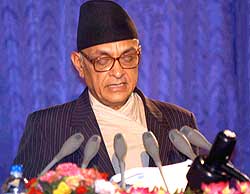 It would be presumptuous to imagine that the movers and shakers take note of this little column, but after three years of writing on economic and business issues, the Beed is happy to note his pet peeves are addressed in the new budget. Finance Minister Prakash Chandra Lohani has tried to inject life into an otherwise mundane budget format to come up with some innovative measures. If implemented, and if peace reigns, it will surely encourage economic growth.
It would be presumptuous to imagine that the movers and shakers take note of this little column, but after three years of writing on economic and business issues, the Beed is happy to note his pet peeves are addressed in the new budget. Finance Minister Prakash Chandra Lohani has tried to inject life into an otherwise mundane budget format to come up with some innovative measures. If implemented, and if peace reigns, it will surely encourage economic growth. That is a lot of 'ifs'. Still, on top of the list is the effort to legitimise political contributions. Lohani's measures seem to echo the frustration regarding the subject that has often featured in this space ('Show us the money', #113). The absence of legitimate ways for parties to raise funds and accept contributions made underhand methods-corruption-a necessity. Business people also found it easier to pass on their illegitimate earnings to them, who in turn did not disclose where it came from. Bringing political donations above board will force transparency on everyone involved.
Recognising private-public partnerships as accelerants of economic growth is laudable. At long last the government sees the private sector as an important catalyst of economic growth. This is visible in the Build Own Operate Transfer (BOOT) agenda and the participation of private and professional institutions in policy formulation. For Nepal, the way ahead lies in partnerships and not in government, civil society, development agencies or private sector functioning each in isolation.
Lohani also announced the much-awaited divestment of government stakes in successful state-owned enterprises ('On privatisation', #72). The Indian experiment is proving to be successful, and by following their example, cash-strapped Nepali governments could have more liquidity. Taking the much politicised transport and the oil sector head-on ('The oil yo-yo', #139) and signalling reforms would bring much needed stability to an industry that is plagued with a problems in quality, distribution and availability. The budget touched upon another Beed favourite-Royal Nepal Airlines Corporation ('Royal Nepal And Corruption', #22). The decision to unbundle the enterprise paves the way for private investors to salvage the carrier and exploit its potential to be a cash cow. The budget also recognises the need to incorporate Bipalis into the Nepali economic mainstream. Hopefully the annual do of the Association of Nepalis in the Americas (ANA) in October will result in some concrete recommendations.
The challenge for the budget, however, is to make good on all the promises. Critics are already lining up an arsenal of writ petitions in court. Perhaps this time the national budget won't fizzle out like damp fireworks. If the government really gets its act together, the Beed will happily eat the largest slice of humble pie regarding last year's comments on the budget exercise ('Who needs a budget', #102).
Readers can post their comments or suggestions to [email protected]



